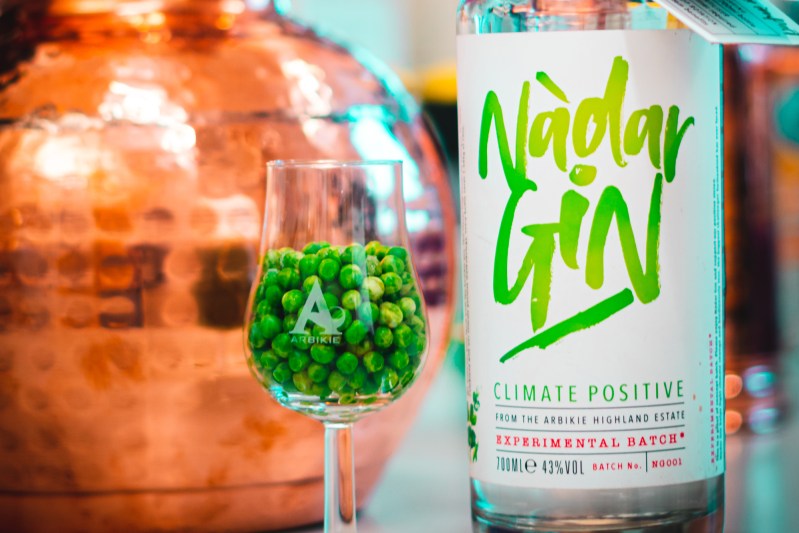Seems like everywhere you look these days, the climate crisis and all the ways our consumption and eating habits are fueling it is front-page news, and the sheer hopelessness of it all just makes you want to have a drink.
Well, now you can have a drink that actually is good for the planet.
Nàdar — a Gaelic word that means “nature” — is the world’s first climate-positive gin or spirit of any kind. Produced by “field to bottle” Scottish distillery Arbikie, which is also known for its Highland Rye and experimental distillates, in collaboration with scientists at the James Hutton Institute and Abertay University, Nàdar turns the traditional gin distillation process on its head by using garden peas to make the base spirit instead of wheat.
Helmed by Ph.D. student Kirsty Black, who is also the master distiller on the project, the choice to use peas was key to reducing the gin’s carbon footprint and creating a more sustainable product.

The wheat typically used to make gin’s base spirit produces a massive carbon footprint, as the industrialized production of these grains requires large amounts of artificial, nitrogen-heavy fertilizer to encourage growth and ensure yield. These fertilizers are widely known to be a significant contributor to greenhouse gas emissions.
By comparison, peas and other legumes are a much more eco-friendly choice as they naturally source their own nitrogen from the air through a process known as “biological nitrogen fixation.” By not needing additional fertilizer, this makes them among the lowest carbon-producing protein-rich foodstuffs. Additionally, Arbikie grows all its ingredients on-site at its farm in eastern Scotland, so there is no additional footprint produced by shipping ingredients. Finally, the waste products of the distillation process — known as “pot ale” — go to make animal feed.
All this comes together to produce a gin that, per 700 ml bottle, only has a carbon footprint of -1.54 kg CO2e (carbon dioxide equivalent). That means that it “avoids more carbon emissions than it creates,” therefore making it a climate-positive product.

The production and distillation process is the same as for any other kind of alcohol, with the starch from the peas removed, broken down, fermented, and then distilled. The peas used are a British-grown variety from Hodmedod’s, a local company that works with British farmers to grow and provide markets with locally produced beans. For botanicals, traditional ones like juniper and coriander are added, as well as lemongrass and citrus leaf (also grown at Arbikie) to make a refreshingly citrus and herbaceous gin.
The big question on everyone’s minds, though, is: What does it taste like? Arbikie and the scientists involved in its creation say that it tastes just like a regular gin, “silky smooth with a fresh and fruity aroma.” And at 43% ABV, it goes down easy.
“Hopefully people enjoy it but then also that it impacts the alcohol industry and other people start considering the different raw materials you can use and how to be more environmentally friendly and sustainable,” master distiller Black says of its creation, which was five years in the making.
Arbikie and the rest of the team behind Nàdar also hope that, by showing the versatility and sustainable benefits of legumes, farmers will be encouraged to increase the cultivation of legumes, peas, and other beans in their crops, promoting biodiversity and improving soil management with crop rotation.
The first batch of Nàdar is now on the market and available for purchase on Arbikie’s website.



